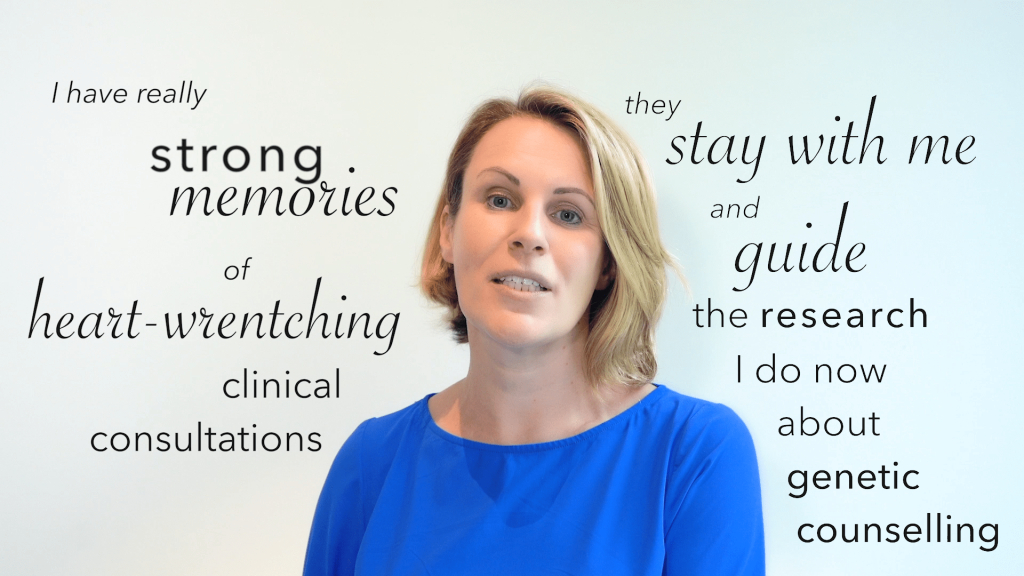Voices of Genetic Counsellors: Walking on the genetics journey
Anna shares her poignant insight into how genetic counsellors go further than simply imparting genetic information, to also “walk in the shoes” of someone being given a complex diagnosis.
Over the past three months the ‘Voice of Genetic Counsellors’ video series has enabled us to step into the shoes of this profession, as experts have shared poignant professional stories, and personal insights into how genetic counsellors support their patients to make sense of inherited disease or having genetic testing.
The project was developed by Wellcome Genome Campus Society and Ethics Research and the Association of Genetic Nurses and Counsellors, to highlight the growing urgency for genetic counsellors, as the demand for genetic testing increases exponentially – both in clinical settings, and with the advent of direct-to-consumer testing.
What these professional insights have demonstrated is just how contingent the mainstreaming of genomics into clinical practice is, on having a structured genetic counselling service in place. With more genetic tests available than ever before, it’s critical that a professional framework is made widely accessible, to help the NHS cope with the deluge of concerns and queries from patients.
What have we learned from these ‘voices’?
Each story from the series, told from the perspective of a genetic counsellor, exemplifies the very specific set of nuanced communications skills they possess – built over many years of experience – to interpret the risk of disease and translate genetic test results, as well as empower individuals to make difficult decisions for the future.
The stories demonstrate how they apply these specialist skills, born out of an integration of clinical genetics knowledge and psychotherapeutic theory, to support patients to understand and process their diagnosis, manage anxiety and grief, and develop plans for communicating with wider family members.
Navigating the unexpected
What’s clearly emphasised throughout the series is that there is no one ‘expected’ response to the impact of genetic information for a family. For patients and genetic counsellors, the emotional landscape surrounding genetic testing is often unexpected and more complex than perhaps anticipated. This places a significant responsibility on genetic counsellors to help patients navigate their complicated thoughts and feelings.
An important relationship with research
As each of the stories have highlighted, genetic counselling demands much more than a simple imparting of scientific fact, and instead, requires a proficiency to translate the scientific evidence, and tailor counselling to the emotional complexities of each patient. This communication process is underpinned by research on and about genetic counselling practice.
For genetic counselling to be effectively integrated into clinical practice it must be evidence-based.
“ For the genetic counselling process to be evidence-based, more genetic counselling research is needed as are more genetic counsellors specialising in research. This is contingent on funders recognising our profession and the valuable service that is delivered to patients. We are actively involved in doing and planning research on how to counsel and illustrate transgender people on family trees in a culturally sensitive and inclusive manner; as well as how chatbot technology can be integrated into genetic counselling as well as practice recommendations on how doctors should balance duties of confidentiality with duties to warn relatives of genetic disease. All of these research projects will play a vital role in shaping the future of healthcare in the genomic era”.
Professor Anna Middleton – (Head of the Wellcome Genome Campus Society and Ethics Research Group.)
Walking in someone else’s shoes
In our final video of the series, Professor Anna Middleton (Head of Society and Ethics Research) underlines the fact that genetic testing is becoming more relevant to all of us, and that research is key to informing clinical practice.

Anna also shares her insights as a registered genetic counsellor, about how the profession goes further than just delivering information to a patient, but instead, allows counsellors to “walk in the shoes of someone else, to experience what that genetic information means for them”.
She also discusses her interests as a research genetic counsellor, and how operating at the intersection between research and clinical practice, provides a gateway for feeding back valuable insights to inform more effective policies and services to improve patient outcomes.
Watch the video below, or visit our YouTube Channel.
The work carried out by Wellcome Genome Campus Society and Ethics Research, aims to bring together science and society to lay the foundations for better communications and understand around complex topics such as genetic testing.
We would like to pay a special thanks to the Association of Genetic Nurses and Counsellors for enabling us to bring this project to the forefront and demonstrate the vital need for policy makers to ensure that there is a systematic incorporation of genetic counselling skills into clinical practice.